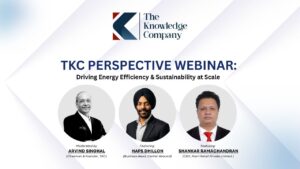

The recent collapse of global negotiations for a legally binding plastic treaty has cast a stark light on the divides in addressing one of humanity’s most pressing environmental challenges.
With nations split between curbing plastic production and focusing solely on waste management, India’s position at the negotiating table – and its subsequent opportunity for global leadership – is now more critical than ever.
In a comprehensive and incisive analysis for Frontline magazine, Ankur Bisen, Senior Partner at The Knowledge Company, unpacks India’s complex stance and outlines a powerful path forward.
The Global Stalemate: Production vs. Waste Management
The Geneva negotiations aimed to establish a comprehensive framework to address plastic pollution across its entire lifecycle.
However, the talks faltered amidst a fundamental divide: countries allied with plastic producers and the petro-industry (including India) argued vehemently against production cuts, emphasizing plastic’s essential role in modern life.
They advocated for solutions centered on improved waste management and recycling.
This “like-minded” group maintained that plastic is indispensable for convenience, medical, and various industrial uses.
This stance contrasted sharply with other nations pushing for mandatory global limits on plastic production, citing stark realities like the fact that only an estimated 9% of global plastic is ever recycled.
India’s Internal Battle: A Microplastic Threat
While India championed the “no production cuts” camp on the international stage, the nation is simultaneously grappling with devastating, real-world consequences of plastic pollution.
Ankur highlights critical examples:
These stark realities underscore the urgency of robust domestic action, irrespective of global treaty outcomes.
An Opportunity for Global Leadership
Ankur argues that despite its position in the negotiations, India now has a unique opportunity to demonstrate powerful leadership.
This isn’t about political statements; it’s about showcasing practical, scalable solutions:
The Path Forward: A Dual Approach
The plastic crisis demands a dual approach: both closing the tap on new plastic production and radically improving waste management systems.
Ankur draws a parallel with the successful Montreal Protocol for ozone protection, emphasizing that similar global resolve is needed for plastics.
Reducing plastic isn’t about outright banning but about reasoned transitions and decreasing dependence, much like the evolving public health policy around sugar.
India possesses the unique strengths and challenges to become a global thought leader in this space.
By building robust systems for formalizing recycling, implementing truly effective EPR, and pioneering policy innovation for blended plastics, India can forge a path that not only cleans its own environment but also inspires the world.
Read Ankur Bisen’s full analysis in Frontline magazine to understand the nuances of this critical environmental challenge: https://frontline.thehindu.com/news/plastic-treaty-collapse-india-leadership-microplastics-policy/article70161556.ece
Supporting Sustainable Futures with The Knowledge Company
Ankur Bisen’s contribution to this discussion exemplifies TKC’s role as a trusted advisor to businesses and governments navigating complex sustainability transitions.
Whether it’s circular economy strategies, waste management policy, or supply chain resilience, our insights are built on decades of experience and real-world data.
We work closely with clients to develop comprehensive strategies that balance economic imperatives with environmental stewardship.
As global climate and resource challenges intensify, our role is to translate complex issues into actionable solutions.
This feature in Frontline magazine aligns with TKC’s ongoing work in:
At TKC, we believe the future requires innovative approaches to resource management, translating global challenges into local opportunities for impact and leadership.
Seeking expert guidance on sustainability challenges or circular economy strategies?
Reach out to TKC for tailored, forward-looking consulting in environmental policy, consumer goods, and industrial transformation.





